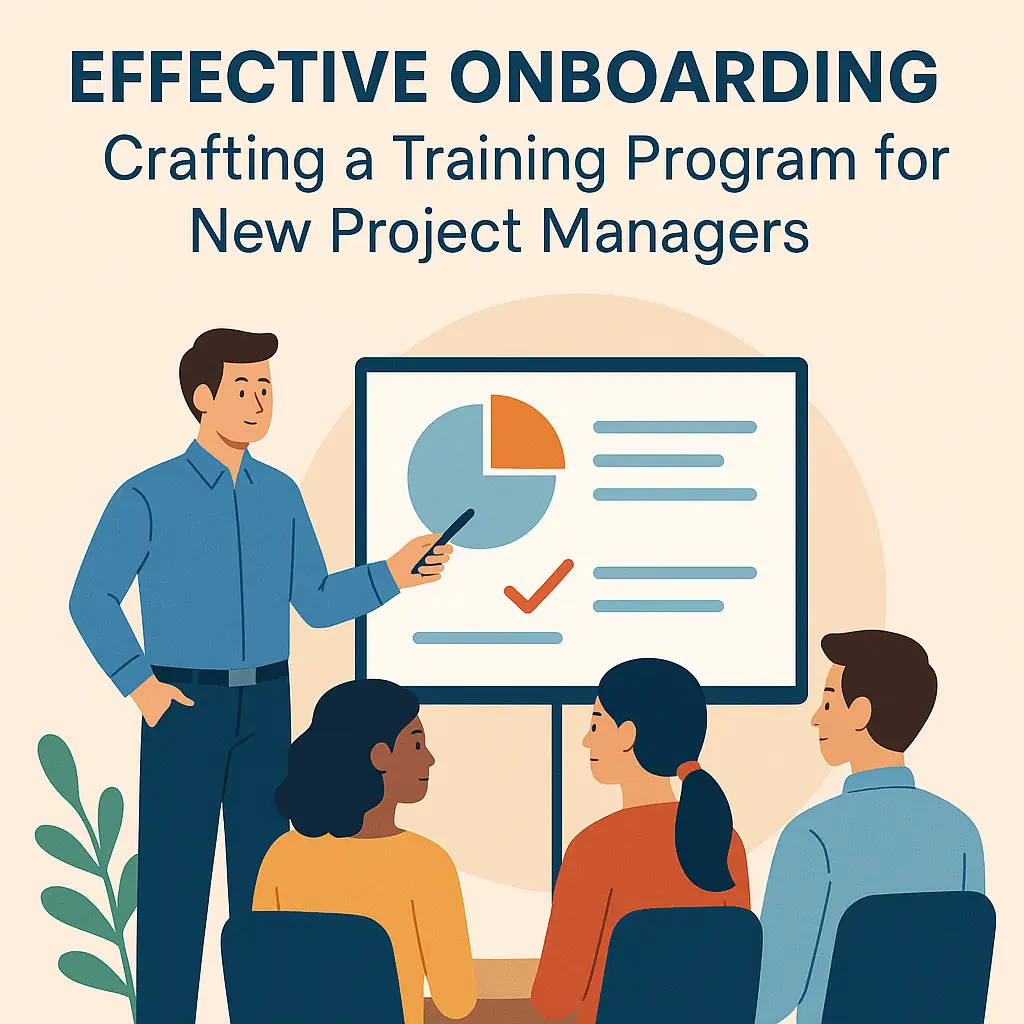Introduction to Training Program Management
Training program management refers to the systematic approach of designing, implementing, and evaluating training initiatives aimed at enhancing the skills and competencies of project managers. This process is crucial for ensuring that new hires are equipped with the necessary tools and knowledge to effectively lead projects and contribute to organizational goals.
Significance of Onboarding in Enhancing Team Performance
Effective onboarding is pivotal in integrating new project managers into their roles and the broader team. A well-structured onboarding program can lead to:
- Faster Adaptation: New project managers who undergo comprehensive training are more likely to acclimate quickly to the organizational culture and project methodologies, reducing the time it takes for them to become productive members of the team.
- Improved Team Dynamics: Onboarding fosters relationships between new hires and existing team members, promoting collaboration and communication. This is essential in project management, where teamwork is often the backbone of success.
- Increased Retention Rates: Organizations that invest in effective onboarding programs tend to see higher retention rates among new hires. When employees feel supported and prepared, they are more likely to remain with the company long-term.
Common Challenges Faced During Onboarding of New Project Managers
Despite the clear benefits, onboarding new project managers can present several challenges:
- Varied Experience Levels: New project managers may come from diverse backgrounds with differing levels of experience. Tailoring training to meet these varied needs can be complex and resource-intensive.
- Integration with Existing Teams: New hires may struggle to fit into established teams, especially if there are pre-existing dynamics or conflicts. Facilitating smooth integration requires careful planning and ongoing support.
- Balancing Training with Immediate Responsibilities: New project managers often face immediate project demands, making it challenging to dedicate time to training. Striking a balance between training and project responsibilities is crucial for effective onboarding.
Understanding the Role of a Project Manager
The role of a project manager (PM) is pivotal to the success of any project. As organizations strive to enhance their project outcomes, it becomes essential to equip new project managers with the necessary skills and knowledge through a well-structured training program. Below are key points that outline the core competencies of a successful project manager, the importance of role clarity for new hires, and how this understanding can aid in tailoring an effective training program.
Core Competencies of a Successful Project Manager
- Leadership Skills: A project manager must possess strong leadership abilities to guide teams, motivate members, and drive project objectives. Effective leadership fosters collaboration and encourages team members to contribute their best efforts.
- Communication Proficiency: Clear and concise communication is crucial for project managers. They must convey project goals, expectations, and updates to stakeholders, team members, and clients. This includes both verbal and written communication skills.
- Organizational Skills: Project managers are responsible for planning, executing, and closing projects. This requires exceptional organizational skills to manage timelines, resources, and budgets effectively.
- Problem-Solving Abilities: Challenges and obstacles are inevitable in project management. A successful PM must be adept at identifying issues, analyzing potential solutions, and implementing effective strategies to overcome them.
- Risk Management: Understanding how to identify, assess, and mitigate risks is a critical competency. Project managers must be proactive in managing uncertainties that could impact project success.
- Technical Proficiency: Depending on the industry, project managers may need specific technical skills or knowledge related to the project domain. Familiarity with project management tools and software is also essential.
Importance of Role Clarity for New Hires
Providing clear role definitions is vital for new project managers as it sets the foundation for their responsibilities and expectations. Here are some reasons why role clarity is important:
- Reduces Ambiguity: New hires often face uncertainty regarding their responsibilities. Clearly defined roles help eliminate confusion, allowing them to focus on their tasks without second-guessing their duties.
- Enhances Accountability: When project managers understand their specific roles, they can take ownership of their responsibilities. This accountability fosters a sense of commitment and encourages proactive behavior.
- Facilitates Team Dynamics: Clarity in roles helps new project managers understand how they fit within the team structure. This understanding promotes better collaboration and communication among team members.
Tailoring the Training Program
Understanding the core competencies and the importance of role clarity allows HR professionals and project management trainers to design a training program that effectively meets the needs of new project managers. Here are some strategies for tailoring the training program:
- Competency-Based Training: Develop training modules that focus on the core competencies identified earlier. This ensures that new hires receive targeted training that enhances their skills in leadership, communication, and problem-solving.
- Role-Specific Scenarios: Incorporate real-life scenarios and case studies that reflect the specific challenges project managers face. This practical approach helps new hires apply their learning in a relevant context.
- Mentorship Programs: Pair new project managers with experienced mentors who can provide guidance, share insights, and offer support as they navigate their new roles. This relationship can significantly enhance the onboarding experience.
- Feedback Mechanisms: Implement regular feedback sessions to assess the effectiveness of the training program. Gathering input from new hires can help refine the program and ensure it meets their evolving needs.
By focusing on these key areas, organizations can create a comprehensive onboarding experience that not only equips new project managers with the necessary skills but also fosters a culture of clarity and collaboration. This strategic approach to training program management will ultimately lead to more successful project outcomes and a more engaged workforce.
Defining Training Objectives and Outcomes
Effective onboarding is crucial for ensuring that new project managers are equipped with the necessary skills and knowledge to thrive in their roles. A well-structured training program not only facilitates a smooth transition for new hires but also aligns with the broader organizational goals. Here are key strategies for defining training objectives and outcomes that will enhance the onboarding experience for new project managers.
Identify Specific Skills and Knowledge Areas
To create a robust training program, it is essential to pinpoint the specific skills and knowledge areas that new project managers need to develop. This can include:
- Project Management Methodologies: Familiarizing new hires with the organization’s preferred methodologies, such as Agile, Waterfall, or Hybrid approaches, ensures they can effectively manage projects from initiation to closure.
- Tools and Software Proficiency: Training should cover the essential project management tools and software that the organization uses, such as Microsoft Project, Trello, or Asana, enabling new managers to utilize these resources efficiently.
- Interpersonal Skills: Emphasizing soft skills such as communication, leadership, and conflict resolution is vital, as these are crucial for managing teams and stakeholders effectively.
By clearly defining these areas, HR professionals and trainers can tailor the training content to meet the specific needs of new project managers, ensuring they are well-prepared for their roles.
Set Measurable Outcomes for Evaluation
Establishing measurable outcomes is critical for assessing the effectiveness of the training program. Consider the following strategies:
- Pre- and Post-Training Assessments: Implement assessments before and after the training to gauge knowledge acquisition and skill development. This can include quizzes, practical exercises, or project simulations that reflect real-world scenarios.
- Performance Metrics: Define key performance indicators (KPIs) that align with the organization’s project management goals. For instance, tracking the successful completion of projects, adherence to timelines, and stakeholder satisfaction can provide insights into the new hire’s performance post-training.
- Feedback Mechanisms: Incorporate feedback from both the new project managers and their supervisors to evaluate the training’s impact. This can help identify areas for improvement in the training program and ensure that it remains relevant and effective.
By setting clear, measurable outcomes, organizations can effectively evaluate the success of their training initiatives and make data-driven decisions for future improvements.
Align Training Objectives with Organizational Framework
To maximize the effectiveness of the training program, it is essential to ensure that the training objectives align with the organization’s project management framework. This alignment can be achieved through:
- Integration with Organizational Goals: Training objectives should reflect the strategic goals of the organization. For example, if the organization aims to enhance customer satisfaction, training can focus on stakeholder engagement and communication strategies.
- Consistency with Project Management Standards: Aligning training content with recognized project management standards, such as those set by the Project Management Institute (PMI), ensures that new project managers are equipped with industry best practices.
- Collaboration with Stakeholders: Engaging with key stakeholders, including senior project managers and department heads, can provide valuable insights into the skills and knowledge that are most critical for success within the organization.
By ensuring that training objectives are closely aligned with the organizational framework, HR professionals and project management trainers can create a cohesive onboarding experience that not only prepares new hires for their roles but also contributes to the overall success of the organization.
Designing the Training Curriculum
Creating an effective training program for new project managers is crucial for their successful integration into the organization. A well-structured curriculum not only equips them with the necessary skills but also fosters a sense of belonging and confidence. Here are key components and strategies to consider when designing a training curriculum:
Components of an Effective Training Curriculum
Modules:
- Core Topics: Identify essential areas such as project planning, risk management, stakeholder engagement, and communication skills. Each module should focus on a specific aspect of project management, allowing for in-depth exploration.
- Progressive Learning: Structure the modules to build on each other. Start with foundational concepts and gradually introduce more complex topics, ensuring that new hires can connect their learning effectively.
Timelines:
- Duration: Define the overall length of the training program. A typical onboarding program might span several weeks, with each module lasting a few days to allow for thorough understanding.
- Milestones: Set clear milestones to track progress. This could include assessments or project simulations at the end of each module to reinforce learning and provide feedback.
Formats:
- Blended Learning: Combine various formats such as in-person workshops, e-learning modules, and virtual classrooms. This approach caters to different learning preferences and allows flexibility in how new hires engage with the material.
- Interactive Elements: Incorporate quizzes, group discussions, and hands-on activities to keep participants engaged and facilitate active learning.
Incorporating Various Learning Styles and Methods
- Workshops: Conduct interactive workshops that encourage collaboration and problem-solving. These sessions can simulate real project scenarios, allowing new managers to practice their skills in a supportive environment.
- E-Learning: Utilize online platforms to provide access to training materials, videos, and assessments. E-learning allows new hires to learn at their own pace and revisit complex topics as needed.
- On-the-Job Training: Pair new project managers with experienced mentors who can provide guidance and support. This hands-on approach helps them apply theoretical knowledge in real-world situations, enhancing their learning experience.
Implementing the Training Program
When it comes to onboarding new project managers, a well-structured training program is essential for ensuring their seamless integration into the team. Here are some practical steps to execute an effective training curriculum:
1. Identify Key Stakeholders
Engaging the right stakeholders is crucial for the success of the training program. Key stakeholders may include:
- Senior Management: Their support can provide the necessary resources and authority to implement the training effectively.
- Project Management Office (PMO): Involvement from the PMO ensures that the training aligns with organizational standards and methodologies.
- HR Professionals: They play a vital role in coordinating the logistics of the training and ensuring that it meets compliance and regulatory requirements.
- Experienced Project Managers: Involving seasoned project managers as mentors or trainers can provide valuable insights and real-world experiences that enrich the training content.
By identifying and involving these stakeholders early in the process, you can create a training program that is comprehensive and tailored to the needs of new hires.
2. Importance of Scheduling and Resource Allocation
Effective scheduling and resource allocation are fundamental to the success of any training program. Consider the following strategies:
- Create a Training Calendar: Develop a clear timeline for the training sessions, ensuring that they do not conflict with critical project deadlines or peak work periods. This helps in maximizing attendance and engagement.
- Allocate Resources Wisely: Ensure that the necessary resources—such as training materials, technology, and venues—are available and accessible. This may include investing in training software, booking meeting rooms, or providing online access to training modules.
- Flexible Learning Options: Consider offering a mix of in-person and virtual training sessions to accommodate different learning preferences and schedules. This flexibility can enhance participation and retention of information.
By prioritizing scheduling and resource allocation, you can create a structured environment that supports effective learning.
3. Creating an Engaging and Interactive Training Environment
An engaging training environment fosters better learning outcomes and retention. Here are some tips to enhance interactivity:
- Incorporate Hands-On Activities: Use simulations, role-playing, and case studies to allow new project managers to practice skills in a safe environment. This experiential learning approach can significantly enhance understanding and application of concepts.
- Encourage Collaboration: Facilitate group discussions and team projects that encourage new hires to collaborate with their peers. This not only builds camaraderie but also allows them to learn from each other’s experiences.
- Utilize Technology: Leverage e-learning platforms, interactive quizzes, and multimedia presentations to make the training more dynamic. Tools like virtual whiteboards and breakout rooms can enhance engagement, especially in remote training settings.
- Feedback Mechanisms: Implement regular feedback sessions where participants can share their thoughts on the training content and delivery. This feedback can be invaluable for continuous improvement of the program.
By focusing on creating an engaging and interactive training environment, you can ensure that new project managers are not only informed but also motivated and prepared to take on their new roles effectively.
Monitoring and Evaluating Training Effectiveness
The onboarding process for new project managers is crucial for ensuring their success and integration into the team. To achieve this, it is essential to implement effective monitoring and evaluation techniques that assess the impact of the training program. Here are several strategies to consider:
Evaluation Techniques
- Surveys and Questionnaires:
- Conduct pre-training and post-training surveys to gauge the knowledge and confidence levels of new project managers. This can help identify areas of improvement and measure the effectiveness of the training content.
- Use Likert scale questions to quantify responses, making it easier to analyze trends and areas needing attention.
- Performance Metrics:
- Establish key performance indicators (KPIs) that align with the goals of the training program. Metrics such as project completion rates, adherence to timelines, and budget management can provide quantitative data on the effectiveness of the training.
- Monitor the performance of new hires over time to see if there is a correlation between training participation and project outcomes.
- Feedback Sessions:
- Organize regular feedback sessions with new project managers to discuss their experiences with the training program. This qualitative data can provide insights into what aspects of the training were most beneficial and which areas may require enhancement.
- Encourage open dialogue to foster a culture of continuous improvement and support.
Adjusting the Training Program
Based on the evaluation results, it is vital to be flexible and willing to adjust the training program. Here are some strategies for making necessary changes:
- Data-Driven Decisions: Analyze the data collected from surveys, performance metrics, and feedback sessions to identify patterns and areas for improvement. For instance, if new hires consistently struggle with a specific aspect of project management, consider revising that section of the training.
- Iterative Updates: Treat the training program as a living document that evolves based on feedback and performance outcomes. Regularly update training materials and methods to reflect best practices and emerging trends in project management.
- Pilot Programs: Before implementing significant changes, consider running pilot programs with a small group of new hires. This allows for testing new training methods and gathering additional feedback before a full rollout.
Importance of Continuous Improvement and Ongoing Support
The journey of a new project manager does not end with the completion of the training program. Continuous improvement and ongoing support are essential for long-term success:
- Mentorship Programs: Pair new project managers with experienced mentors who can provide guidance, share insights, and offer support as they navigate their new roles. This relationship can enhance learning and foster a sense of belonging within the organization.
- Refresher Courses: Offer periodic refresher courses or advanced training sessions to help new project managers stay updated on the latest tools, techniques, and methodologies in project management.
- Feedback Loops: Establish a system for ongoing feedback where new hires can continuously share their experiences and challenges. This not only helps in refining the training program but also demonstrates the organization’s commitment to their professional development.
By implementing these strategies for monitoring and evaluating training effectiveness, HR professionals and project management trainers can ensure that new project managers are well-equipped to succeed in their roles, ultimately leading to improved project outcomes and organizational success.
Fostering a Supportive Culture for New Project Managers
Creating a supportive culture is essential for the successful onboarding of new project managers. This culture not only facilitates a smoother transition but also enhances overall team performance and employee satisfaction. Here are some key strategies to foster such an environment:
1. Role of Mentorship and Peer Support
- Mentorship Programs: Establishing a mentorship program can significantly ease the transition for new project managers. Pairing them with experienced mentors allows for personalized guidance, helping them navigate the complexities of their new roles. Mentors can share insights about organizational processes, project management tools, and team dynamics, which can be invaluable for new hires.
- Peer Support Networks: Encouraging the formation of peer support groups can create a sense of community among new project managers. These groups provide a platform for sharing experiences, discussing challenges, and celebrating successes. Such interactions can foster camaraderie and reduce feelings of isolation that new hires may experience.
2. Importance of Feedback and Open Communication Channels
- Regular Check-Ins: Implementing regular check-ins between new project managers and their supervisors can facilitate open communication. These meetings should focus on discussing progress, addressing concerns, and providing constructive feedback. This practice not only helps new hires feel valued but also allows for timely adjustments to their training and integration process.
- Feedback Mechanisms: Establishing formal feedback mechanisms, such as surveys or suggestion boxes, can empower new project managers to voice their opinions about the onboarding process. This feedback can be instrumental in refining training programs and ensuring they meet the needs of new hires.
3. Fostering an Inclusive Culture
- Promoting Diversity and Inclusion: An inclusive culture that values diverse perspectives can enhance the onboarding experience for new project managers. Organizations should actively promote diversity in their teams and ensure that all voices are heard. This can be achieved through training sessions that emphasize the importance of inclusivity and respect for different viewpoints.
- Encouraging Continuous Learning: Organizations should cultivate a culture that promotes ongoing learning and development. Providing access to training resources, workshops, and professional development opportunities can motivate new project managers to enhance their skills and adapt to their roles more effectively. Encouraging a growth mindset will help them view challenges as opportunities for learning rather than obstacles.
Conclusion
The integration of new project managers into an organization is crucial for maintaining productivity and ensuring project success. A structured training program serves as the backbone of effective onboarding, providing new hires with the necessary tools, knowledge, and confidence to excel in their roles. Here are the key takeaways to consider:
- Importance of a Structured Training Program: A well-designed training program not only accelerates the learning curve for new project managers but also fosters a sense of belonging and commitment to the organization. It equips them with essential skills, such as project planning, risk management, and stakeholder communication, which are vital for their success and the overall performance of the team.
- Review and Refine Onboarding Processes: HR professionals and project management trainers should regularly assess their onboarding processes to identify areas for improvement. This could involve gathering feedback from recent hires, analyzing training outcomes, and staying updated with industry best practices. By continuously refining these processes, organizations can ensure that they are meeting the evolving needs of their project managers and the demands of the market.
Resources for Further Reading and Development: To support ongoing development in training program management, consider exploring the following resources:
- Books: Titles such as “The New Manager’s Handbook” and “Project Management for the Unofficial Project Manager” provide valuable insights into effective management practices.
- Online Courses: Platforms like Coursera and LinkedIn Learning offer courses specifically tailored to project management and training program development.
- Professional Associations: Joining organizations such as the Project Management Institute (PMI) can provide access to a wealth of resources, networking opportunities, and industry standards.
By implementing these strategies and utilizing available resources, HR professionals and trainers can create a robust onboarding experience that not only enhances the skills of new project managers but also contributes to the long-term success of their projects and the organization as a whole. Now is the time to take action—review your current onboarding practices and make the necessary adjustments to foster a culture of continuous learning and development.
Find out more about Shaun Stoltz https://www.shaunstoltz.com/about/.
This post was written by an AI and reviewed/edited by a human.



